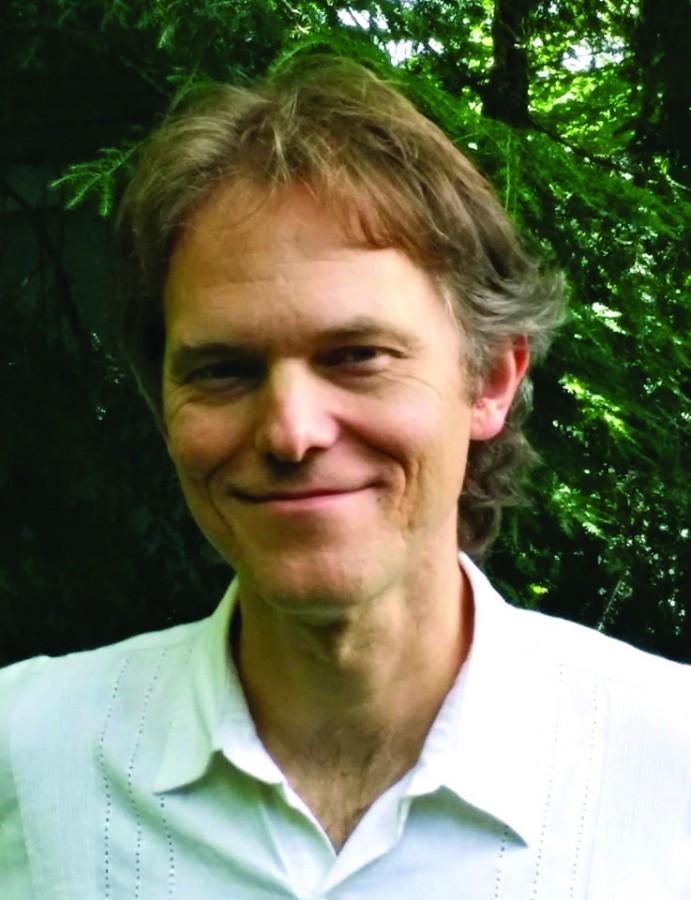Adrian Ivakhiv of the University of Vermont was welcomed to Bucks County Community College on February 11 to speak about the relationship between religion and the environment, along with the Pope’s influence on the world.
Ivakhiv, a professor of environmental studies, thought, and culture at Vermont, as well as author of Ecologies of the Moving Image: Cinema, Affect, and Nature, presented “No Papal Bull: Pope Francis’s Encyclical on Care for our Common Home.” It centered on the Laudato Si’ (“Praise Be to You”), which is the Pope’s encyclical, or circular letter concerning Catholic doctrine.
Jorge Mario Bergoglio, more commonly known as Pope Francis, released Laudato Si’, also dubbed by Ivakhiv the “Environmental Encyclical,” in June of last year. It is the most recent of over 300 editions dating back to the 1700s, and is highly regarded by those involved with the Catholic Church.
Ivakhiv gave an in-depth look at the Laudato Si’ and the themes that have emerged from it. Social and environmental justice was a main tenet of Ivakhiv’s presentation, along with subjects related to ecology, technology, and science as a whole.
In his work, the Pope deals with fixing environmental issues and helping the poor by looking towards religion. These issues have affected the world going all the way back to the beginning of civilization, and Ivakhiv notes that Native Americans and Latinos have argued that “environmental issues affect non-white communities more than white.”
Ivakhiv also briefly touched on consumer capitalism, or throwaway culture that has been expressed by Pope Francis.
Laudato Si’ has been met with acclaim as well as criticism. Environmentalists, as well as those who are involved with social justice, have expressed their approval for the Pope’s encyclical. Catholic and non-Catholic liberals have also commended the work. On the other hand, conservatives and the “economic right” have expressed their disdain for Laudato Si’, mostly through the condemnation of the amount of science that was present in the missive.
Ivakhiv mentioned the impact that Pope Francis’s appearances in the United States have had in, not only the religious community, but on everyone. He has made more people cognizant of poverty, war/arms trade, immigrants/refugees, human trafficking, and death penalty opposition. Ivakhiv provided graphs that concluded that “more people are worried” about the effects of climate change due to hearing the Pope talk about it.
While some did not approve of the Pope’s speeches regarding environmental and social justice, Ivakhiv showed an interesting survey with several questions posed to Catholics and non-Catholics. One question was, “How many would think [climate change] is a religious issue?”
After hearing the Pope speak on the matter, the percentage of Catholics that said yes to that question doubled from before. The concern from people the world over, religious or not, for the effects of climate chance has grown.
The Catholic Church’s recognition of the issue certainly is a step in the right direction.
Some questions related to both climate change and religion are yet to be answered, including if there is going to be more of a dramatic shift among the Catholic Church and conservatives in regards to environmental issues.
At the recent Paris climate change conference, it was clear that Laudato Si’ had an impact on many world leaders. According to Ivakhiv, the attendees “arrived at an agreement most people didn’t expect,” although it may have “opened the door for more work.” In the end, it turned out to be, in Ivakhiv’s opinion, “the most successful climate change conference in history.” Climate change issues are not the responsibility of Pope Francis to fix; the people must be engaged. So far, it seems that the Pope’s call for awareness has made a great impact on people of the United States and around the world.


